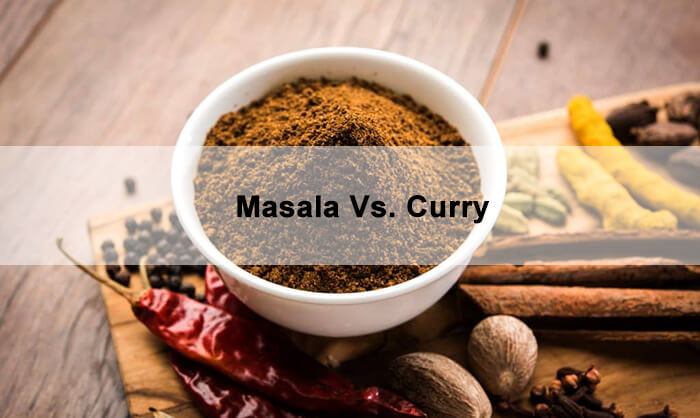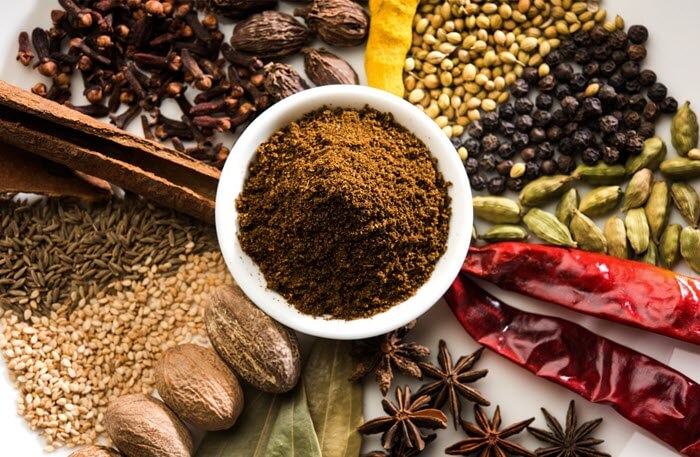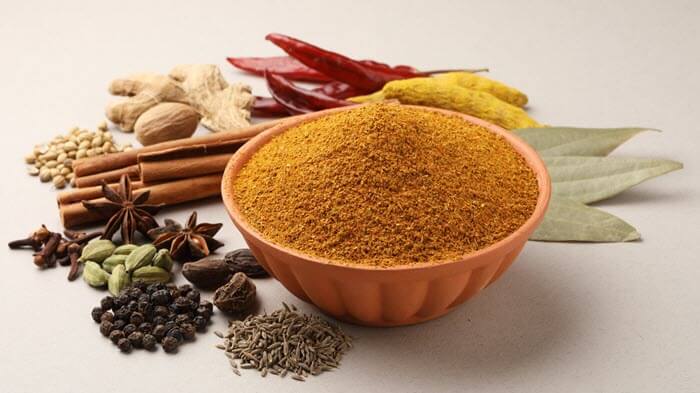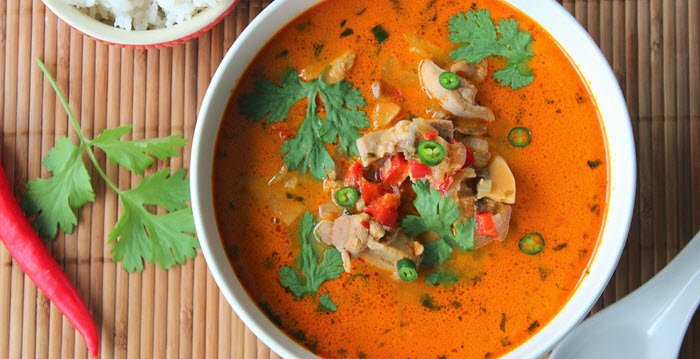Eat like nobody is watching you. Enjoy food like that’s the only thing left in your world!
To enjoy your meal, you need all its constituents to mix perfectly; most importantly, it requires the right spice to create a delicious meal.
This article will explain the difference between masala and curry, two ingredients that give your meal a fantastic taste.
Table Of Contents
Summary: Masala Vs. Curry
Masala and curry originate from India. Usually, persons who are not familiar with Indian culture interchange both terms and end up confused about what they both mean.
Curry can be both a food sauce and a spice. When it’s referred to as a food sauce, it is some sort of meal with vegetables, meat, herbs, and salt. In contrast, masala is one of the spices added to prepare curries and give them more flavor.
Is Masala the Same as Curry?
No, masala is not curry. Instead, masala is a spice used to prepare curries, making them more flavored and tasty.
Curry is usually a meal that contains vegetables, meat, and other ingredients. It can also be a spice – curry powder.
Remember that:
- Masala is an Indian spice used to prepare Indian dishes.
- Curry can refer to both a spice (curry powder) or a food sauce.
- As a spice, curry is mild and tasty but not as aromatic and tasty as Masala.
- Masala is usually aromatic and flavorful.
- Most times curry can only be used as a substitute for masala when there is no other alternative. It’s more like a last resort.
Read further to find the details about masala and curry.
What Is Masala?
Masala, also called Garam Masala, is a spice blend of various spices like bay leaf, cumin seeds, cloves, coriander seeds, shah jeera, cinnamon, mace, and cardamom pods. They are all toasted in a cooking pan (to release aromatic flavors), after which they are grounded into a powder.
Depending on what you intend to prepare, masala can be used in vegetable sauce, meat, or chicken. It can also season for packed foods like instant noodles and the rest.
Every masala combination is unique and special, so you can be sure your meal is packed with nutrients.
You may like: Tikka Masala Vs. Butter Chicken
What Does Masala Taste Like?
Due to the complexity of masala, it can be really hot or just mild and warm enough. We can attribute this quality to the presence of cloves, cinnamon, or peppers.
If the condiments are more on the sweet side, then it tastes sweet. Or it could have a tangy taste, as seen in those that contain coriander seeds.
Additionally, the taste and spice level are also dependent on the region in India where it is prepared. So up north, you get a less spicy and more aromatic masala, while down south, the spicier it gets.
Types of Masala
Depending on the dish you intend to prepare, these are a few types of masala you’d come across:
1. Tandoori Masala
Tandoori Masala is a traditional spice in Punjabi dishes with a distinct alluring aroma and smokiness.
It consists of ground ginger, cumin, mango powder, cloves, coriander seeds, peppercorns, Kasuri Methi, cardamom, red chili powder, ground garlic, turmeric, and bay leaf.
2. Chaat Masala
If you need to create Indian Street food with a tangy flavor, chaat masala is the best spice to achieve that. It’s an ingredient in most tangy Indian Street food.
Chaat masala contains carom seeds, coriander seeds, black pepper, asafoetida, mango powder, mint, cumin, and red chili powder.
3. Biryani Masala
Biryani Masala is made up of star anise, bay leaf, coriander, cloves, cinnamon, nutmeg, cardamom, black pepper, and fennel seeds.
4. Panch Phoron
In Hindi, Panch Phoron means “blend of five spices”. Including black mustard seeds, nigella seeds, cumin, fenugreek seeds, and fennel seeds.
5. Chana Masala
The condiments of Chana Masala are Kashmiri red chili, black pepper, nutmeg, cardamom, cloves, fennel, cinnamon, coriander, and ginger.
The ingredients in this spice are comfortable and make for an aromatic and delicious meal.
6. Sambar Masala
Southern India has a spicy vegetable stew made primarily with lentils called Sambar.
To prepare this dish, you need a masala spice that includes Bengal gram, red chili, curry leaves, coriander seeds, asafoetida, fenugreek, black pepper, and turmeric.
7. Masala Tea Powder
If you want to enjoy a good cup of Indian chai, then the right spice is critical. As such, you need the masala tea powder.
The main ingredients of masala tea powder are green cardamom, nutmeg, black pepper, ginger, cloves, cinnamon. If you like to jazz things up a little, you might add dried rose petals or saffron.
Spices are key to achieving the right flavor in your meal, but you need the key ingredients to achieve the perfect spice, just as we have seen from the different types of masala.
What Is Curry?
Before we delve into what a curry is, there are two things you need to understand.
Spice
Curry powder refers to a spice that is the origin of the British. It is usually used in Indian recipes, but its constituents are not as aromatic or spicy as masala.
Vegetable Sauce
Curries refer to sauces made with vegetables, meat, or even seafood. And sometimes, depending on their origin masala could be an ingredient of curries.
You may like: Panang Curry vs Red Curry
What Does Curry Taste Like?
Curry powder is mild, it’s a good spice, but it’s not as hot or spicy as masalas. The main ingredients of curry make it taste relatively mild and flavorful.
Usually, curries are mild to taste, but if you like them spicy, you can always add masala spice or peppers.
Types of curry
- Vegetarian Curry: it is a sauce that has a vegetable base. In essence, the key ingredients of this sauce are vegetables like lentils, mushrooms, cabbages, paneer, and more.
- Non-vegetarian Curry: this sauce uses animal meat like chicken, beef, or even seafood to prepare the curry.
You may like: Massaman Curry Vs. Panang Curry
Difference Between Masala and Curry Powder
We would discuss the difference between Masala and Curry powder under a few subheadings.
Masala | Curry | |
Color | Dark brown or reddish color | Usually yellow |
Taste | Spicier and more aromatic | Milder |
Type | Over seven types | Vegetarian and non-vegetarian |
Cooking | Added at the beginning or end | Added at the beginning |
Constituents | Hot spices | Milder spices |
1. Color
A critical distinction between the spices masala and curry is their color.
Masala has a dark brown or reddish color, while curry sauce comes in different colors depending on the ingredient. And curry powder is usually yellow.
2. Taste
Curry powder has a milder taste and is less spicy, while masala is spicier and more aromatic. And as a sauce, curries are mild but can become spicy with the addition of masala.
3. Type
There are two major curries, vegetarian and non-vegetarian. When it comes to the masala, it has over seven types and is ingredients for different foods.
4. Cooking
Masala can be added to a meal either at the beginning or end to make it flavorful. On the other hand, curry powder is usually added at the beginning of the cooking.
5. Constituents
The baseline elements of masala and curry powder differ, which affects their taste and color.
Curry powder has milder spices which makes it less spicy, while hot spices like cloves and peppers give masala its fiery taste.
Final Words
At this point, you should be able to tell the difference between Masala and curry. Hopefully, this article simplified their differences and helped you understand better what they are.
Now you are armed with this information, make your meals tastier and more enjoyable by choosing the right spice!




